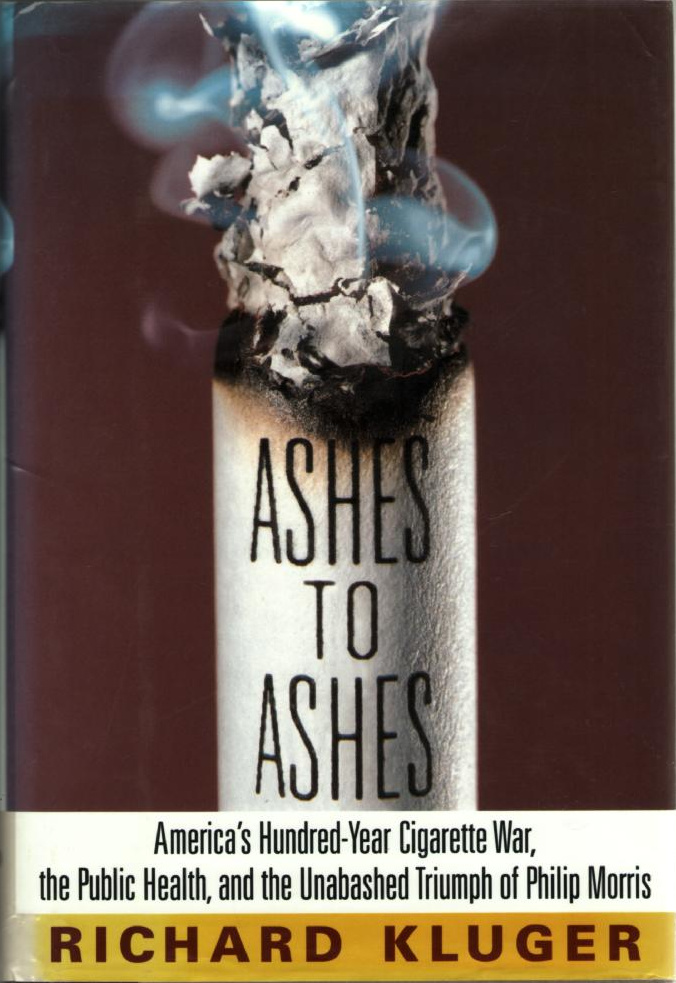Hardcover, 807 pages
English language
Published 1996 by Alfred A. Knopf.
America's Hundred-Year Cigarette War, The Public Health, And The Unabashed Triumph Of Philip Morris

Hardcover, 807 pages
English language
Published 1996 by Alfred A. Knopf.
The most important and most riveting work we have yet had from Richard Kluger, whose greatly acclaimed landmark books, Simple Justice and The Paper, have become classics in their fields. Ashes to Ashes is a monumental history of the American tobacco industry: its awesome and ironic success in developing the cigarette, modern society's most widespread instrument of self-destruction, into America's most profitable consumer product; its energized, work-obsessed royal families, the Dukes and the Reynoldses, and their battling successors like the eccentric autocrat George Washington Hill and the feisty Joseph F. Cullman; its generations of entrepreneurial geniuses; its cunning business strategies and marketing dazzle; its deft political power plays; its relentless, often devious attacks on antismoking forces in science, public health, and government. And there is the weirdly symbiotic relationship of an industry geared at any cost to sell, sell, sell cigarettes, and an American public habituated to ignore all warnings …
The most important and most riveting work we have yet had from Richard Kluger, whose greatly acclaimed landmark books, Simple Justice and The Paper, have become classics in their fields. Ashes to Ashes is a monumental history of the American tobacco industry: its awesome and ironic success in developing the cigarette, modern society's most widespread instrument of self-destruction, into America's most profitable consumer product; its energized, work-obsessed royal families, the Dukes and the Reynoldses, and their battling successors like the eccentric autocrat George Washington Hill and the feisty Joseph F. Cullman; its generations of entrepreneurial geniuses; its cunning business strategies and marketing dazzle; its deft political power plays; its relentless, often devious attacks on antismoking forces in science, public health, and government. And there is the weirdly symbiotic relationship of an industry geared at any cost to sell, sell, sell cigarettes, and an American public habituated to ignore all warnings and buy, buy, buy.
At the center of this epic is the continuing drama of the Philip Morris company and the crafty men at its helm. The youngest, smallest entry in the business, it remained an underdog until the historic sex-change operation that transformed the Marlboro from little more than a woman's fashion accessory to the ultimate emblem of hairy-chested machismo (and made it America's--and the world's--brand) and the source of the company's global prosperity, mounting even as the news about cigarettes and health grows more dire.
Caught up in the Philip Morris story is the whole sweep of America's cigarette history, from the glory days of rampant hucksterism--when smokers would "walk a mile for a Camel," Winstons tasted good "like a cigarette should," and the whole nation could decipher "L.S./M.F.T."--to the bombshell 1964 Surgeon General's report that definitively indicted smoking as a killer, to the age of the massive mergers that spawned RJR Nabisco and Philip Morris-Kraft General Foods.
Here is how the leaf that was the New World's most passionately devoured gift to the Old grew into human-kind's most dangerous consumer product, employing whole rural populations, fattening tax revenues, and spawning a ring of fiercely competitive corporate super-powers; how tobacco's peerless public-relations spinners applied their techniques to becloud the overwhelming evidence of the cigarette's lethal and addictive nature; and finally, at this historic moment in the cigarette wars, how both the besieged industry and the aroused public-health forces nationwide are maneuvering as the battle rages ever more ferociously.
Richard Kluger began a career in journalism at The Wall Street Journal, and was a writer for Forbes magazine and then the New York Post before becoming literary editor of the New York Herald Tribune. In book publishing he served as executive editor at Simon and Schuster and editor in chief at Atheneum. In addition to his two books of social history, he has written six novels. He and his wife, Phyllis, who have two sons and have written two novels together, live near Princeton, New Jersey.